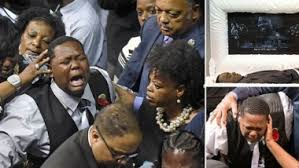 5 STAGES OF GRIEF-by (Eric D.Graham)-With all the murder and mayhem in the Nation, overseas, in our neighborhoods, where within a 60-hour period during the Memorial Day Weekend 59 people were shot, 13 fatally in Chicago and within our family during these troubling times, we must admit that, we are all trying to copy with all the death and destruction on the nightly news. Especially, with the murders of Alton Sterling and Philando Castile that sparked righteous outrage, which led to the assassination of eight police officers in Dallas and Baton Rogue. As a result, I offer the 5 STAGE OF GRIEF, which we all are going through- in order to cope with this- seemingly- endless pain-Pocket Full of Ghetto Poems-
5 STAGES OF GRIEF-by (Eric D.Graham)-With all the murder and mayhem in the Nation, overseas, in our neighborhoods, where within a 60-hour period during the Memorial Day Weekend 59 people were shot, 13 fatally in Chicago and within our family during these troubling times, we must admit that, we are all trying to copy with all the death and destruction on the nightly news. Especially, with the murders of Alton Sterling and Philando Castile that sparked righteous outrage, which led to the assassination of eight police officers in Dallas and Baton Rogue. As a result, I offer the 5 STAGE OF GRIEF, which we all are going through- in order to cope with this- seemingly- endless pain-Pocket Full of Ghetto Poems-1. Denial – It is really the first of our reactions to any form of sudden loss. Depending on the relationship we share to the subject of our loss, the more our lives may be uprooted or altered. It is very common for people to try and initially deny the event in order to subconsciously avoid sadness, or the thought of pending mental struggles. People in denial often withdraw from their normal social behavior and become isolated. Denial has no set time frame, or may never be felt at all. However, it is considered the first stage of grief.
2. Anger – People that are grieving often become upset with the person or situation which put them in their grief state. After all, their life could now be in complete disarray. The path of least resistance is anger as opposed to facing the consequences of a loss head on. In the case of death, the anger is often focused toward the deceased for leaving that person behind and unable to cope. Other times people become angry at themselves if they feel they could have done something more to stop the loss from happening.
3. Bargaining – This is when those who are grieving are reaching out to the universe to make the pain go away. It is actually very normal, and largely considered to be a sign that they are beginning to comprehend their situation. People will often try to make a deal, or promise to do anything, if the pain will be taken away.
4. Depression – Contrary to popular belief, depression is something that may take some time to develop. We often think we are depressed when a grief event first occurs, but there is usually a lot of shock and other emotions present before any real depression can set in. The signs of depression due to grief usually appear when a sense of finality is realized. This is not to be confused with clinical depression, which may be chronic. Depression due to grief is technically episodic, even though it may last for a lengthy period of time.

5. Acceptance – This is the point where the person experiencing grief no longer is looking backward to try and recover the life they once had with the deceased, or other cause of their grief episode. It is not to say that they no longer feel the vast array of emotions brought on by their grief, but they are ready to embrace the idea that they are reaching a new point in there lives. At this point, they are beginning to understand that there is a new beginning on the horizon.
Acceptance should not be confused with healing or recovering from the loss, since that would put an enormous amount of pressure on people experiencing grief. Acceptance is really the beginning of the real healing process. It is the point where recovery becomes about the person left behind, and not about the person being mourned.
www.bobbeethehater.blogspot.com



